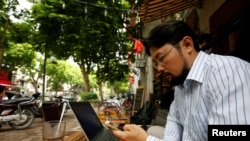An international advocacy group's claim that the Vietnamese government has tapped hackers to target activists shows that the communist Southeast Asian state is widening the use of technology to quash its biggest opponents, experts believe.
Ocean Lotus, a shadowy group suspected of working with the Vietnamese government, is "behind a sustained campaign of spyware attacks," London-based Amnesty International said in a statement on February 24 following two years of research. It says the attacks surfaced in 2014 and targeted rights activists and the private sector, inside Vietnam as well as abroad.
The hack attacks would signal a growing use of technology to muzzle strong vocal opponents of Vietnam's officials, country observers say. Police already use internet trolls and authorities have been known to damage people's Facebook accounts, said James Gomez, regional director of the Asia Centre, a Bangkok-based think tank.
The Cybersecurity Law decree that came into force in 2019 helps the government build evidence against naysayers by ordering online service providers such as social media platforms to do some of its surveillance work.
"Social media manipulation and intimidation forms part of Vietnam's set of tools to neutralize online criticism as well as activists who use social media to mobilize for action," Gomez said. "The identities of these online trolls who engage in social media manipulation are not publicly known but are largely thought to be aligned with the state and the Ministry of Public Security."
Controlling criticism
Vietnam does not censor specific websites as its communist neighbor China does, nor does it hunt down every criticism vented against it online. Unless the country faces "mass mobilization on a national scale" against the ruling party, the government will stay with today's approach of targeting dissent case by case, Gomez said.
But authorities in Hanoi hope to sustain an image that they are competently managing the economy that's fueled by factory investment but was damaged by a slump in global demand last year during the coronavirus pandemic.
The government wants to "control" criticism inside and outside the country, said Phil Robertson, deputy Asia director with the New York-based advocacy group Human Rights Watch.
"It's a dirty tricks government that will use whatever capacity it has in terms of tech and hacking to go after its opponents," Robertson said.
The Vietnamese Ministry of Foreign Affairs rejected hacking allegations last year when cybersecurity firm FireEye also identified a government connection to Ocean Lotus.
"This is groundless information," deputy ministry spokesperson Ngo Toan Thang told a news conference in May, as quoted on the ministry's website. "Vietnam strictly bans all cyber-attacks against organizations and individuals in any form."
The ministry's English-language website does not address Amnesty International's claims.
Amnesty International's Security Lab said in the February 24 statement it had found Ocean Lotus's influence in phishing emails sent to two Vietnamese "human rights" advocates. One lives in Germany, the statement says, and the other was a Vietnamese nongovernmental organization in the Philippines.
"The hacking group has been repeatedly identified by cybersecurity firms as targeting Vietnamese political dissidents, foreign governments and companies," the statement adds.
Vietnam 'cyber-troops'
French journalism advocacy group Reporters Without Borders said in 2018 Vietnam had appointed 10,000 "cyber-troops" to fight online dissent. The journalism group called the deployment an "army of internet trolls" aimed at attacking independent media outlets.
Authorities showed last year they can quickly shutter social media accounts registered in foreign countries.
After Vietnamese blogger Bui Thi Minh Hang livestreamed an interview with a woman whose 3-year-old child was exposed to tear gas, her posts quickly disappeared from Facebook and YouTube and she was arrested hours later. She lost access to her accounts.
Jack Nguyen, a partner at the business advisory firm Mazars in Ho Chi Minh City, suggests that internet commentators stick to issues rather than targeting the state or the Communist Party. Pollution and drought are acceptable topics, he said, and it's even OK to suggest policy changes.
"Don't criticize the party," Nguyen said. "You can criticize some of the policies but don't do anything that they can say that it's counterrevolutionary."






